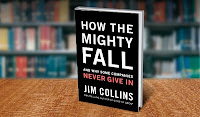
Surprise, surprise…I’m a little behind in my reading list ☺
My most recent read – How the Mighty Fall by Jim Collins – was a quick but inspirational read. You’ve probably read some of his more popular books. Good to Great is a personal favorite of mine, but I haven’t read his old faithful, Built to Last. I actually found a copy of it at a used bookstore last weekend, so it will make its way to my list shortly, but I was excited about How the Mighty Fall because it is recent and reflects some of the challenges that have emerged in business as a result of the current economic climate.
The book is primarily a case study of a number of companies that were, at one time, considered great and powerful organizations and how a sequence of events led to their eventual demise. Big name companies are picked apart – Circuit City, Motorola, HP, Scott Paper, and Zenith, to name a few – and it is ironic to be introduced to similarities between such diverse and unique companies that brought about grave ramifications.

One piece of the book that stood out to me was the chapter that talked about denial. Collins outlined a number of characteristics that define teams that are on the way up versus teams that are on the way down. Team on the way up are honest, even when it’s uncomfortable, use high question to statement ration, challenge people to discover their own answers, gives credit to other people for their success, and argue and debate not as a way to improve their personal position but to find the best answers to further the overall cause. Team on the way down, on the other hand, shield people in power from grim fact, assert strong opinions without providing back up data, avoid critical input, shut down questions, seek credit only for themselves, and argue to look smart or to improve their own interests rather than argue to find the best answers for the team. I found application in those statements as I look at my current role with my small team and think of ways to make sure we are indeed making an upward climb as opposed to getting stuck in a downward spiral.
The final chapter of the book analyzes companies that have successfully steered their way through a season of genuine crisis and emerged into greatness again. Collins asserts that the defining factor in such climbs is leadership. “The right leaders feel a sense of urgency in good times and bad, whether facing threat or opportunity, no matter what. They’re obsessed, afflicted with a creative compulsion and inner drive for progress – burning hot coals in the stomach – that remain constant whether facing threat or not.” Makes me hope I am taking the right steps to develop such resolve in my own journey into leadership – I think I have a long way to go ☺

No comments:
Post a Comment